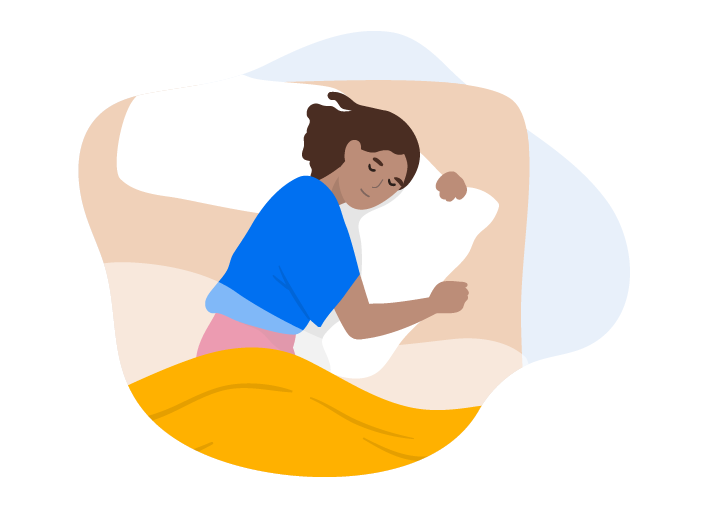
8 Remedies For Stress Relief and Better Sleep
Stressful situations, financial concerns or remembering past experiences can all contribute to insomnia and keep you from sleeping soundly. Restless nights only add more pressure and add another source of anxiety – creating an endless cycle.
Simple stress relief techniques such as deep breathing, progressive muscle relaxation, Tai Chi, Yoga and Meditation are effective at soothing both mind and body.
1. Breathing Exercises
Stress and anxiety can trigger the “fight or flight” response in your body, leading to shallow breathing, tightened muscles, increased heart rate and other symptoms.
Deep breathing exercises are an easy and effective way to ease tension before bed. According to science, these breathing techniques stimulate your vagus nerve, which oversees mood, digestion and breathing processes.
Try lion’s breath, 4-2-4 breathing or other simple breathing exercises as an easy and relaxing way to combat stress. They’re suitable for use anytime and anyplace!
2. Exercise
Exercise can be an effective natural solution to combating stress. Exercise lowers cortisol levels in your body while simultaneously increasing endorphin production – your brain’s natural painkillers.
Physical activity can help address sleep disorders. Exercise can reset your circadian rhythm, enhance quality sleep, and relieve symptoms of depression and anxiety. Choose an activity you enjoy that you will stick with; just be careful not to exercise too close to bedtime as this could act as an auditory stimulant and result in interrupted restful slumber.
3. Relaxation Techniques
Stress has long been acknowledged to cause health concerns such as high blood pressure and mental health concerns, leading to high rates of anxiety. Relaxation techniques are effective ways of relieving tension and improving sleep quality.
Like any skill, relaxation techniques require practice to master. They’re most effective when used consistently over time as part of an overall self-care and wellness strategy; among the more popular relaxation strategies are:
4. Meditation
Meditation programs can be an effective way to reduce stress. Meditation encourages mindfulness, relaxation and controlled breathing in order to lower heart rate and blood pressure.
Studies have demonstrated that meditation helps reduce psychological stress while improving sleep quality.
If stress is keeping you from sleeping enough, avoid long daytime naps and physical activity around bedtime to limit stress-induced insomnia. And if an undiagnosed condition is interfering with your restful rest, seek medical advice immediately for a comprehensive assessment of your sleeping pattern.
5. Yoga
Yoga is an ancient spiritual practice which unites body and mind through physical postures, breathing exercises, meditation techniques and mindfulness practices. Today it’s often seen as an exercise program with many health benefits for strength training, stress reduction and sleep quality improvement.
Just before bed, try some restorative yoga to relax the mind and transition the body towards restful slumber. Don’t use your bedroom; find somewhere peaceful within your home where you can stretch out before sleeping.
6. Yoga Asanas
Yoga helps reduce stress by relaxing both body and mind. Yoga also improves flexibility, breathing rate, heart rate and heart rate regulation as well as helping alleviate depression or anxiety.
Lizard Pose can help you sleep faster and achieve higher quality restful rest. Even beginners can learn this pose easily before bedtime!
Yoga helps increase GABA (anti-anxiety neurotransmitters) and serotonin production – two natural chemicals known to fight stress – while simultaneously decreasing cortisol levels which may interfere with sleeping patterns or cause insomnia.
7. Meditation
Meditation has long been practiced as an effective self-care strategy and spans cultures, continents, and religions worldwide.
Meditation can help soothe both body and mind by helping to ease stress in multiple studies.
Remember, these tips should only serve as supplements to your current sleep health regimen and not as replacements for medical advice. If you suspect having a serious sleeping disorder, seek medical help immediately for diagnosis and treatment plan advice from your healthcare provider.
8. Relaxation Techniques
Stress relief techniques can be effective strategies for relieving tension and anxiety as well as improving sleep quality. They involve shifting focus away from thought processes and towards body awareness; and can be undertaken both individually or with assistance from healthcare providers.
Practice relaxation techniques regularly so they become easier to access in times of emotional turmoil. There are various relaxation methods available, including progressive muscle relaxation (tensing and releasing muscles), autogenic training, guided imagery/visualization techniques and guided imagery or visualization.


